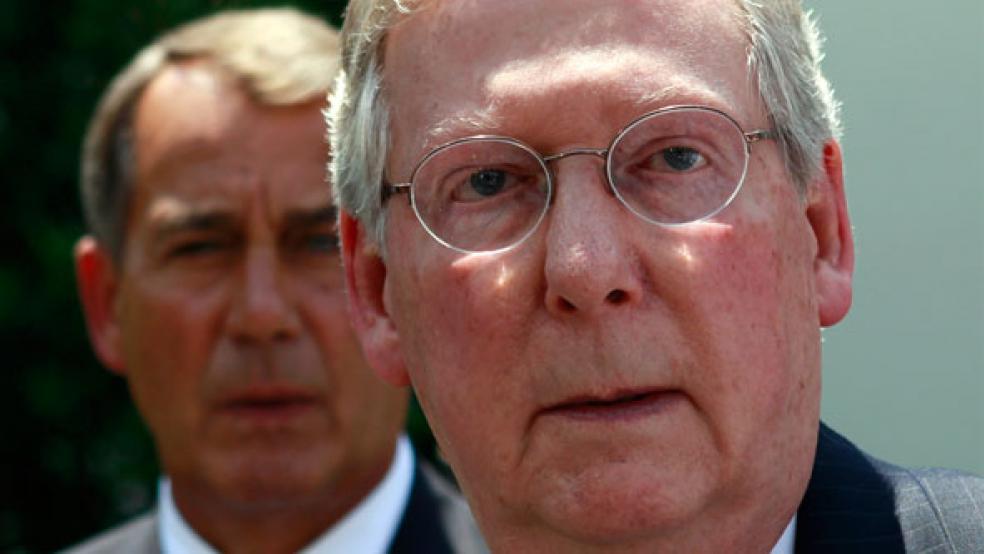It’s no more Mr. Nice Guy for Senate Minority Leader Mitch McConnell.http://www.thefiscaltimes.com/Articles/2013/01/06/McConnell-Bests-Boehne...

Just a week ago, the Kentucky Republican sealed a compromise with Vice President Joe Biden to stop a devastating tax hike and delay for two months $109 billion in sequestered budget cuts. But on the unfinished business of raising the debt ceiling, McConnell is getting aggressive.
Unless President Obama bends to their will on entitlement spending cuts, GOP lawmakers plan to withhold their approval on lifting the government’s borrowing authority. Appearing Sunday on NBC’s “Meet the Press,” McConnell seemed sheepish about pursuing a strategy that could put the government into an economically devastating default, yet he claimed there was no other choice.
“It's a shame that we have to use whatever leverage we have in Congress to get the president to deal with the biggest problem confronting our future—and that's our excessive spending,” McConnell said. “If we're not going to deal with it now, when are we going to deal with it? And we've watched the government explode over the last four years. We've dealt with the revenue issue.”
RELATED: New Debt Ceiling Standoff May Cause Market Plunge
Besides the debt ceiling, the continuing resolution that has been a substitute for the budget also ends in March. The combined economic damage of the debt ceiling, having no federal budget, and the start of the sequestered cuts means the country remains in grave financial danger.
The deal McConnell reached with Biden agreed to hike the top tax rate to 39.6 percent on household incomes above $450,000—generating more than $600 billion over the next decade.
But Democrats and Republicans are sharply divided over Medicare and Social Security expenditures that are projected to balloon due to Baby Boomer retirements.
Republicans see the risk—roughly a decade away—as an immediate threat that chokes off economic growth. They generally favor increasing the eligibility age from 65 and applying means testing to limit benefits for high income people.
“You know Warren Buffett's always complaining about not paying enough taxes,” McConnell said. “And what I'm complaining about is we're paying for his Medicare. We ought not to be providing these kinds of benefits for millionaires and billionaires.”
House Speaker John Boehner, R-Ohio, has previously stipulated that any dollar added to the debt ceiling be matched by spending cuts, a requirement repeated on Sunday by South Carolina Sen. Lindsey Graham.
But with Boehner pledging to remove himself from one-on-one talks with the White House on the fiscal cliff, the ball is largely in McConnell’s court. That’s just fine with Republicans like Sen. Orrin Hatch of Utah. “He’s tough as nails. He really stands up for his beliefs and my beliefs. He’s smart as can be and he’s a prodigious worker,” Hatch told The Fiscal Times. “He’s one of the best minority leaders of all time.”
Many Democrats counter that the Medicare and Social Security changes floated by Republicans would either achieve little in deficit reduction or shift medical costs once covered by the government onto consumers—ultimately hurting the economy.
Obama has previously embraced some Republican-proposed savings for the programs—such as using a less generous measure of inflation to calculate benefits. However, Obama’s acceptance of a more realistic inflation measure (known as chained-Consumer Price Index) was tied to a failed “grand bargain” on both taxes and spending.
The president has repeatedly said he will not bargain over raising the $16.4 trillion debt ceiling.
"The debt ceiling is about spending that has already occurred," House Minority Leader Nancy Pelosi, D-Calif., said on CBS’ “Face the Nation.” "Right now, we have to pay the bills that have been incurred. And if you want to say 'cut spending for what we do next,' fine, but don't tie it to the debt ceiling."
Instead, Obama and congressional Democrats say they intend to address the deficit with more tax increases, in addition to spending cuts. Rep. Chris Van Hollen, D-Md., said Sunday that congressional Republicans will have to back down on their demand that any tax reform be revenue neutral.
"If Mitch McConnell is going to draw that line in the sand, it's going to be a recipe for more gridlock," the ranking Democrat on the House Budget Committee told “Fox News Sunday.”
For some economists, the only way to explain Washington is through the cinematic adaptation of a J.R.R. Tolkien epic.
“These days the US budget process is like the movie ‘The Hobbit’: a seemingly endless journey that alternates between rather boring dialogue and increasingly bloody battle scenes with a last-minute escape,” Bank of America Merrill Lynch economists Ethan Harris and Michelle Meyer wrote in a note to clients. “The fiscal cliff was the latest such battle, but ahead lay the three great gorges: the spending sequester, the continuing budget resolution and the debt ceiling. We have vanquished the goblins, but Gollum, the trolls and the dragon lie ahead.”
That summary hints at the problematic tenor of the conversation right now. Two months ahead of the deadline, it’s largely unclear what the last-minute escape looks like this time around. Republicans and Democrats each refuse to back down from their positions on the debt ceiling, yet both claim the other side will surrender and prevent the nation from a historic default. They exhibit little faith in each other, while trusting that there will be a safe outcome.
"Well, absolutely we're going to not default,” House Ways & Means Committee Chairman Dave Camp told Bloomberg TV on Friday. “That's just not even part of the issue.”





